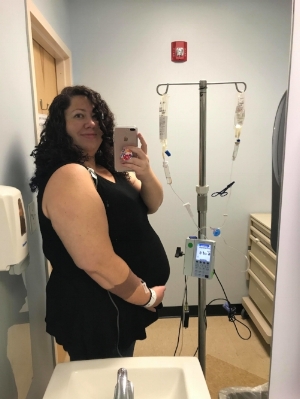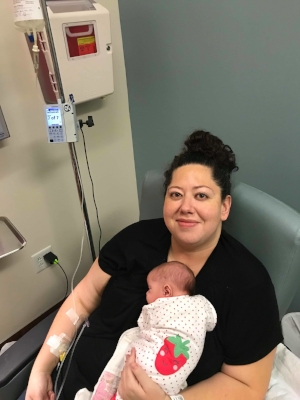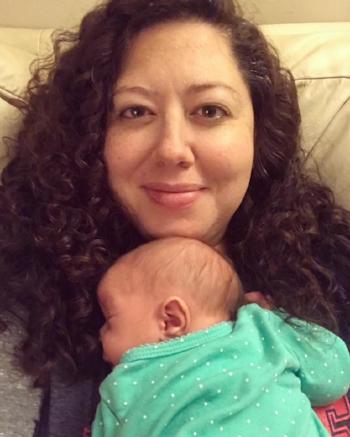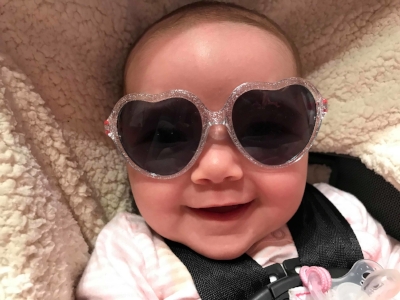Coping | IBD | Ostomy


I was diagnosed with ulcerative colitis in April 2014, just six months after my wedding. While my husband and I were finding our feet as husband and wife, my bathroom trips increased and I rapidly descended into my first “oh dear God I’m dying” flare. A colonoscopy was finally ordered, after which I was handed a discharge paper that said “Ulcerative Colitis. Medication being sent to your pharmacy.” That was it.
My new husband and I drove home, somewhat bewildered as to what Ulcerative Colitis was. Cursory googling was scary. We worried about the impact on our lives – would I be able to return to work? I was planning on going back to school and changing my career. Could I do it? What about kids? We’d gotten married just before my 30th birthday, and I was so scared that my biological clock would run out while we dealt with this disease. My husband didn’t marry me knowing this diagnosis. Would this change our relationship? I felt like it was a bait and switch. I turned from super healthy and happy fiancé to miserable wife who couldn’t walk across a room without help.
I miraculously found a friend of a friend with Crohn’s and asked ALL THE QUESTIONS. He gave me the name of his GI, and I made an appointment, pleading with the receptionist to get me in as soon as possible. The GI who diagnosed me not only had given me NO information with my diagnosis, but refused to discuss what impact the disease and the medications to treat the disease would have on my ability to get pregnant, stay pregnant, and have a healthy child. She insisted I go on medications without discussing what was safe for pregnancy and what wasn’t, and what I needed to do to have a healthy pregnancy. I honestly don’t think she knew the answers to my questions, so she brushed them off.
My new GI was so incredibly intelligent and kind. She told me our first priority was getting my UC in remission and finding medications that worked well with the least side effects. She would pursue only medications that were safe to stay on through pregnancy so I wouldn’t have to cycle through medications too quickly, and if we needed to move to something that was not pregnancy safe, we’d talk it through first. She checked my vitamin levels and kept a holistic view of my health in mind as she worked to find a treatment that gave us the best results. She encouraged me to focus on doing everything in my power to stay healthy – eating as well as flares allowed, staying hydrated, taking vitamins, getting enough rest. Knowing I was working at these things allowed us to sort out what was a symptom of a coming flare and what was just poor self-care. Was I tired all the time because I didn’t prioritize sleep and rest or because I was severely anemic? Was I severely anemic because I wasn’t taking my iron pills faithfully or because I was bleeding? She empowered me to take good care of myself and leave the disease treatment to her. Remission came in bursts then faded as I failed drug after drug. I started Humira and reached remission that lasted.
To help us move towards a healthy pregnancy, she started me on folic acid, which actually helped my brain fog too. She checked my vitamin levels to make sure no deficiencies were present, and we found a vitamin regimen that kept my levels in good ranges. She gave me the all clear to start trying for a baby, with the warning that if I began to flare to give her a call and we’d work on it, and to stop trying until I was back in remission. She told us that roughly a third of women with IBD feel better while pregnant, a third feel the same, and a third get worse, but going into pregnancy in “full deep remission” was a great place to start. It wasn’t that I COULDN’T get pregnant while flaring, just that it was in the best interest of the baby and myself to be as healthy as possible before getting pregnant. We tried for about a year and a half, working to find any other underlying issues which might prevent pregnancy. We found nothing except a very slightly sluggish thyroid. We took off trying for a couple months while my Humira trough levels were checked, and I began taking it every week. That worked for awhile, but joint pain set in that was debilitating. For me, joint pain has always been a precursor to a flare. I needed a handicapped parking placard to get around and struggled to work. My GI began the prior authorization process for Remicade while educating me on studies of pregnant women and the studies which following their children showing the safety of the drug in comparison to untreated disease in pregnancy. We talked about how Remicade is safe for breastfeeding too, and how we would just withhold the only live vaccine given to infants before 6 months (the rotavirus vaccine), in an overabundance of caution in case any Remicade had made it into baby’s system. When I became pregnant, she said to call her and we’d start shifting my infusion dates so my last one would be at 32 weeks, and my next the week after baby was born. I began Remicade in December 2016, and was given the all clear to start trying for a baby again by mid-January, much faster than expected. I responded better to Remicade than any other drug I’d tried. I was in the fullest, deepest remission of my life. At the end of February, I got a POSITIVE pregnancy test!
My GI recommended seeing a high risk OB (aka maternal fetal medicine specialist). I asked for her personal recommendation, as I wanted an OB who was familiar with IBD pregnancies, Remicade, and working with GIs to ensure any issues were dealt with properly. I saw a MFM specialist in the same hospital as my GI, and they’d worked together on many other IBD moms. All of my prenatal care was through the Maternal Fetal Medicine clinic of my hospital (some women see a normal OB who consults with an MFM specialist). I really appreciated the extra care paid to my baby and I when working with a MFM specialist. My first phone consult was at 5 weeks along, and my first ultrasound was at 6 weeks when we got to hear our daughter’s heartbeat! We had around 7 ultrasounds total, and had non-stress tests done for the last 8 weeks of pregnancy. I did have high blood pressure which started mid-pregnancy, and that meant a bit more monitoring. I never developed pre-eclampsia, and it could have just been a side effect of Remicade.
My MFM specialist asked us to induce at 39 weeks to reduce the risk of pre-eclampsia which increases at the tail end of pregnancy. Baby girl was a bit stubborn though, and after 3 rounds of Pitocin over three days and having my water broken, she still wasn’t descending. I had concerns about a c-section, particularly with scar tissue, the potential for fistulas, and the effect it could have on any surgical intervention I may need in the future for my UC. The OBs were excellent in calming my fears with science and experience. My baby girl was born on November 3rd via c-section.
Within 6 hours I was able to get out of bed without assistance, and within 48 hours we were heading home. I had the option of staying another two days, but being in your own bed is magical for healing! My c-section recovery was unremarkable, and dare I say, easy. My doctors and nurses repeatedly stated they were amazed at how calm I was, how high my pain tolerance was, how adept I was at dealing with a hospital stay, how I could rattle off my medication list while half asleep, and when I replied “well, I have Ulcerative Colitis”, they all said “Oh, that’s why. You’re a pro.”
I am. I’m a pro now at doctors and hospitals and fighting with insurance companies. I’m a pro at things I never asked to excel at. My little girl is three months old now, and I’ve had time to process the pregnancy and her birth. I have no regrets at all. I am so glad I was in remission when I got pregnant. While I know that it’s possible to get pregnant while flaring and still have a good outcome, I was able to better care for myself while pregnant because I went into it being as healthy as possible. I worried a lot less. When I was nauseous I felt happy because I knew it was morning sickness and not anything else. I’m a pro at nausea too, so I just pulled out my ginger hard candies and sipped my water just as I did when flaring and struggling to keep food in. When my pelvis began to shift and round ligament pain set it, I smiled because my body was getting ready to birth my baby, not because it was broken, yet again.
My ulcerative colitis symptoms began when I was 17, quite mildly. It was dismissed by a dozen doctors as menstrual or “women’s” issues. Being diagnosed properly at 30 was hard. I’d had 13 years of my body not working right, and no one knowing why. I spent another three years being raging mad at my body for being broken and – well, ok, this is where I usually use a lot of swear words. How could this thing have crept up right after getting married, RIGHT when we were talking about kids? Having a body that doesn’t work properly has been so hard…but pregnancy was redeeming for me. For my body. My body (along with our good friend Remicade) decided to buck up and have a baby. My body nourished her, while nourishing me too. My body helped her grow and develop, and girls, she is A MIRACLE. Now, I look at her and I’m reminded that my body is capable of good things too. And because of IBD, I’m a stronger mom.
If you’re worried that kids may not be possible for you, I hear you. I can’t say whether bio kids will happen or not, but I can say that there is so much out there to help us. Great doctors, amazing medications, nurses who know how to calm our fears and encourage us. Make an appointment with your GI just to talk about pregnancy, and have a pre-pregnancy appointment with a high risk OB. Both doctors will be happy to see that you are committed to your health and the health of your future kid(s), and will be happy to discuss all this with you. If they’re not, find a new doctor.

Andrea Acosta is a mom, a developmental psychology student, and a digital marketer. She lives in North Carolina where she salsa dances with her husband and makes messes with her great big crafting ideas. She can normally be found playing with her dog Phoebe Buffay and soaking in the miracle that is her daughter, Violet.


Thank you so much for sharing your story! I’m on Remicade and now 5 weeks pregnant, your story is very encouraging! Question, were you able to nurse, and if so, did you have to delay live vacine longer?